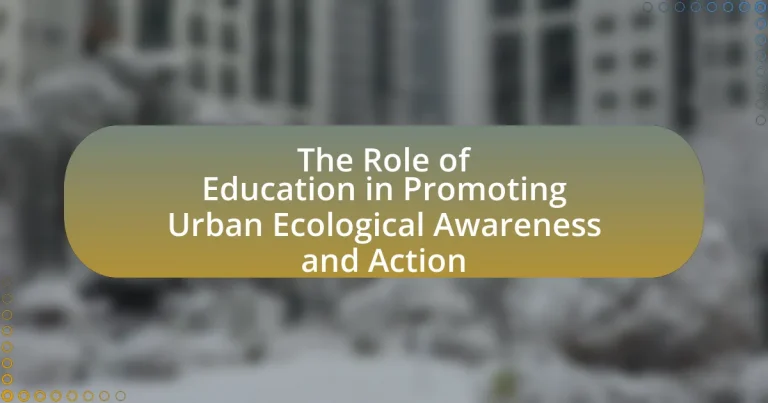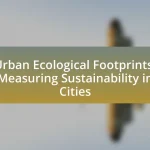The article examines the critical role of education in fostering urban ecological awareness and action. It highlights how educational institutions can equip individuals with the knowledge and skills necessary to address environmental challenges in urban settings, emphasizing the importance of integrating sustainability and ecological principles into curricula. Key strategies discussed include experiential learning, community engagement, and the use of digital tools to enhance ecological literacy. The article also explores the impact of various educational approaches on urban ecological behaviors and the significance of community participation in promoting sustainable practices. Overall, it underscores the necessity of education in driving proactive environmental stewardship within urban communities.
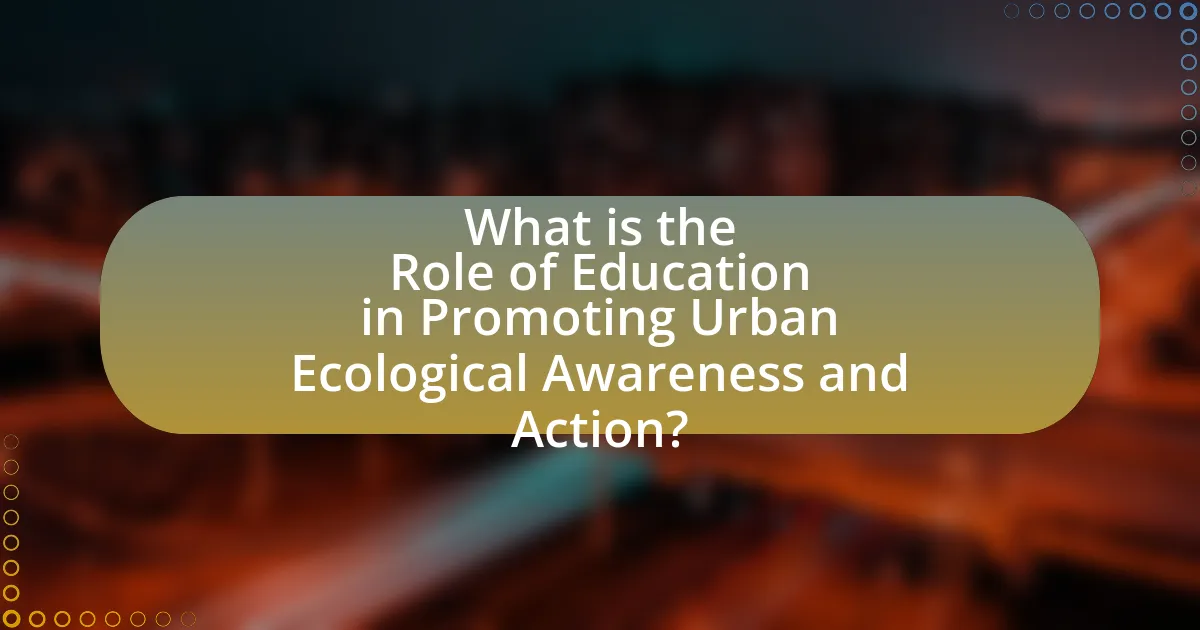
What is the Role of Education in Promoting Urban Ecological Awareness and Action?
Education plays a crucial role in promoting urban ecological awareness and action by equipping individuals with the knowledge and skills necessary to understand and address environmental challenges in urban settings. Through curricula that incorporate sustainability, conservation, and ecological principles, educational institutions foster critical thinking and problem-solving abilities among students. For instance, studies show that environmental education programs can lead to increased civic engagement and community involvement in ecological initiatives, as evidenced by the 2018 report from the National Environmental Education Foundation, which found that students who participated in such programs were more likely to engage in local environmental projects. This connection between education and action highlights the importance of integrating ecological concepts into educational frameworks to inspire proactive environmental stewardship in urban communities.
How does education influence urban ecological awareness?
Education significantly enhances urban ecological awareness by providing individuals with knowledge about environmental issues and sustainable practices. Through structured curricula, educational programs raise awareness of urban ecological challenges such as pollution, biodiversity loss, and climate change. For instance, studies show that students who participate in environmental education programs demonstrate increased understanding of ecological concepts and exhibit more environmentally responsible behaviors. Research conducted by the National Environmental Education Foundation indicates that 80% of students exposed to environmental education are more likely to engage in conservation activities. This correlation underscores the critical role education plays in fostering a more informed and proactive urban populace regarding ecological matters.
What are the key educational strategies for raising ecological awareness in urban settings?
Key educational strategies for raising ecological awareness in urban settings include experiential learning, community engagement, and integration of sustainability into curricula. Experiential learning, such as urban gardening projects, allows participants to directly interact with their environment, fostering a deeper understanding of ecological principles. Community engagement initiatives, like workshops and local clean-up events, encourage collaboration and collective action, enhancing awareness through shared experiences. Furthermore, integrating sustainability topics into school curricula ensures that students receive consistent education on ecological issues, which is supported by studies showing that early education on environmental topics leads to more environmentally responsible behaviors in adulthood.
How do different educational approaches impact urban ecological behaviors?
Different educational approaches significantly influence urban ecological behaviors by shaping individuals’ knowledge, attitudes, and actions towards the environment. For instance, experiential learning, which involves hands-on activities and real-world problem-solving, has been shown to enhance environmental stewardship among urban residents. A study by the National Environmental Education Foundation found that participants in community-based environmental education programs demonstrated a 50% increase in pro-environmental behaviors compared to those who received traditional classroom instruction. This indicates that interactive and participatory educational methods are more effective in fostering sustainable practices in urban settings.
Why is urban ecological awareness important?
Urban ecological awareness is important because it fosters sustainable practices that mitigate environmental degradation in urban settings. Increased awareness leads to informed decision-making among residents, promoting actions such as recycling, energy conservation, and green space preservation. Studies indicate that cities with higher ecological awareness experience improved air quality and reduced urban heat islands, contributing to better public health outcomes. For instance, research published in the Journal of Urban Ecology highlights that urban green spaces can lower temperatures by up to 5 degrees Celsius, demonstrating the tangible benefits of ecological awareness in urban planning and community engagement.
What are the environmental challenges faced by urban areas?
Urban areas face significant environmental challenges, including air pollution, water scarcity, waste management, and loss of biodiversity. Air pollution in cities is often caused by vehicle emissions and industrial activities, leading to health issues; for instance, the World Health Organization reported that urban air pollution contributes to approximately 4.2 million premature deaths annually. Water scarcity is exacerbated by over-extraction and pollution of water sources, affecting both human consumption and ecosystem health. Waste management poses a challenge due to the high volume of waste generated, with cities producing over 1.3 billion tons of solid waste each year, according to the World Bank. Lastly, urbanization leads to habitat destruction, threatening biodiversity; studies indicate that urban areas can reduce local species populations by up to 75%. These challenges necessitate urgent attention and action to promote sustainable urban living.
How does ecological awareness contribute to sustainable urban development?
Ecological awareness significantly contributes to sustainable urban development by fostering informed decision-making and promoting environmentally responsible practices among urban planners and residents. This awareness leads to the integration of green spaces, energy-efficient buildings, and sustainable transportation systems, which collectively reduce urban carbon footprints. For instance, cities that prioritize ecological education often see increased public support for policies that protect natural resources and enhance biodiversity, as evidenced by the implementation of urban green initiatives in cities like Copenhagen, which has committed to becoming carbon neutral by 2025. Such initiatives demonstrate that ecological awareness not only informs policy but also encourages community engagement and stewardship, ultimately leading to more resilient and sustainable urban environments.
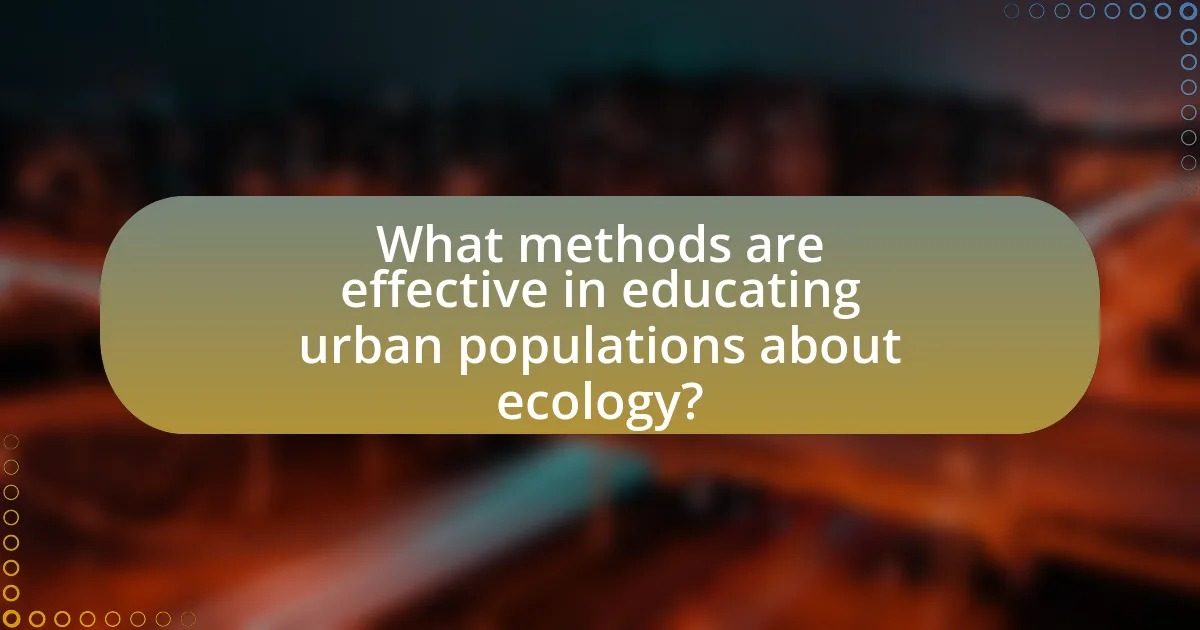
What methods are effective in educating urban populations about ecology?
Effective methods for educating urban populations about ecology include community workshops, interactive educational programs, and the use of digital platforms. Community workshops foster direct engagement and allow participants to learn about local ecological issues through hands-on activities, which have been shown to increase awareness and promote sustainable practices. Interactive educational programs, such as school-based initiatives and public seminars, provide structured learning environments that can effectively convey ecological concepts and their relevance to urban living. Additionally, digital platforms, including social media campaigns and online courses, reach a broader audience and facilitate the dissemination of ecological knowledge, making it accessible to diverse urban populations. These methods collectively enhance ecological literacy and encourage proactive environmental stewardship in urban settings.
How can experiential learning enhance ecological education in cities?
Experiential learning enhances ecological education in cities by providing hands-on, real-world experiences that deepen understanding of environmental issues. This approach allows learners to engage directly with their urban ecosystems, fostering a sense of connection and responsibility towards their environment. For instance, programs that involve community gardening or urban wildlife monitoring have been shown to increase awareness of biodiversity and sustainability practices among participants. Research indicates that students who participate in experiential learning activities demonstrate improved environmental literacy and are more likely to adopt pro-environmental behaviors, as evidenced by studies conducted by the National Environmental Education Foundation, which found that active participation in ecological projects significantly boosts knowledge retention and engagement in sustainability initiatives.
What role do community projects play in experiential ecological education?
Community projects serve as vital components of experiential ecological education by providing hands-on learning opportunities that engage participants in real-world environmental issues. These projects facilitate direct interaction with local ecosystems, allowing individuals to observe, analyze, and contribute to ecological restoration and sustainability efforts. For instance, studies have shown that community-based environmental initiatives, such as urban gardening or habitat restoration, enhance ecological literacy and foster a sense of stewardship among participants. This engagement not only deepens understanding of ecological principles but also encourages collective action towards urban ecological awareness and sustainability.
How can urban schools incorporate ecological education into their curricula?
Urban schools can incorporate ecological education into their curricula by integrating hands-on environmental projects, such as community gardens and local biodiversity studies, into existing subjects like science and social studies. This approach not only enhances students’ understanding of ecological principles but also fosters a sense of responsibility towards their urban environment. Research indicates that experiential learning, such as outdoor classrooms and field trips to local ecosystems, significantly improves student engagement and retention of ecological concepts. For instance, a study by the National Wildlife Federation found that students participating in outdoor learning experiences showed a 27% increase in environmental knowledge compared to traditional classroom settings.
What technologies can support ecological education in urban areas?
Technologies that can support ecological education in urban areas include mobile applications, interactive digital platforms, and augmented reality tools. Mobile applications like iNaturalist enable users to document and share local biodiversity, fostering community engagement and awareness. Interactive digital platforms, such as online courses and webinars, provide accessible information on sustainability practices and urban ecology. Augmented reality tools, like those used in educational apps, allow users to visualize ecological concepts and urban ecosystems in real-time, enhancing understanding and retention. These technologies facilitate hands-on learning experiences and promote active participation in ecological initiatives, thereby increasing urban ecological awareness and action.
How can digital tools facilitate ecological awareness among urban residents?
Digital tools can facilitate ecological awareness among urban residents by providing accessible information and interactive platforms that promote environmental education. For instance, mobile applications can offer real-time data on air quality, waste management, and local biodiversity, enabling residents to understand their ecological impact. Research indicates that 70% of urban dwellers use smartphones, making these tools effective for disseminating information quickly and widely. Additionally, social media campaigns can engage communities in discussions about sustainability practices, fostering a sense of collective responsibility. Studies show that communities involved in digital engagement initiatives report higher levels of environmental awareness and participation in local ecological activities.
What are the benefits of using social media for ecological education?
Using social media for ecological education enhances awareness and engagement among diverse audiences. Social media platforms facilitate the rapid dissemination of information, allowing educational content about ecological issues to reach a global audience instantly. For instance, studies show that campaigns on platforms like Facebook and Twitter can increase public participation in environmental initiatives by up to 30%. Additionally, social media fosters community building, enabling users to share experiences and solutions related to ecological challenges, which can lead to collective action. The interactive nature of these platforms encourages discussions and knowledge sharing, making ecological education more accessible and relatable.
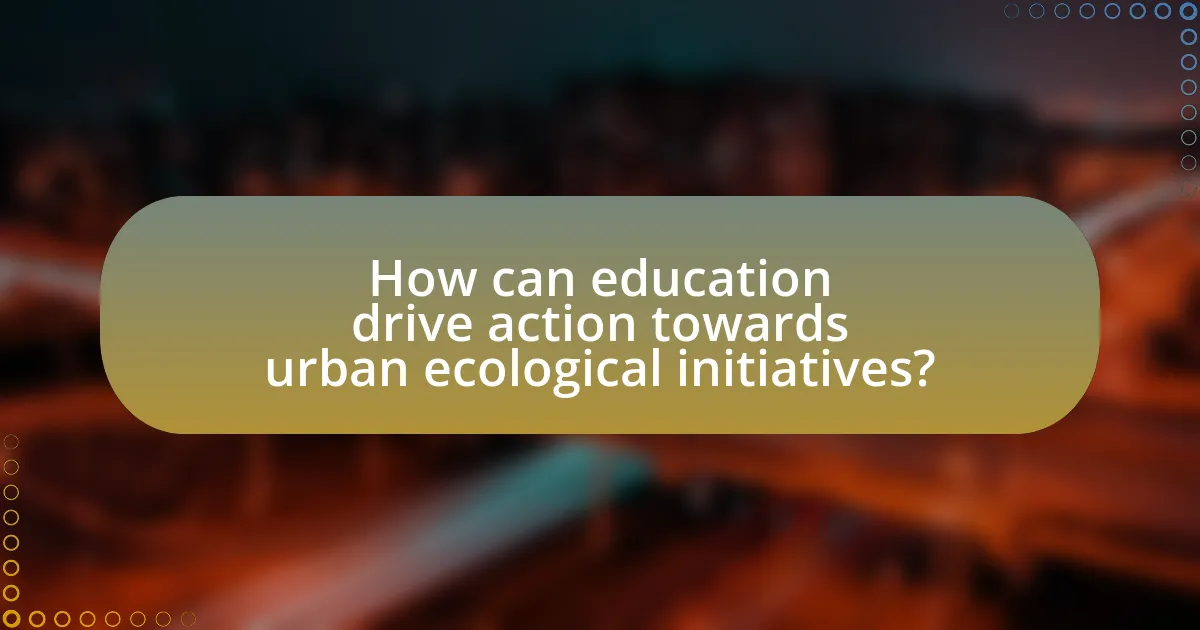
How can education drive action towards urban ecological initiatives?
Education can drive action towards urban ecological initiatives by equipping individuals with the knowledge and skills necessary to understand environmental challenges and implement sustainable practices. For instance, educational programs that focus on urban ecology can raise awareness about issues such as pollution, biodiversity loss, and climate change, motivating students and community members to engage in local ecological projects. Research indicates that communities with higher levels of environmental education are more likely to participate in initiatives like community gardens, recycling programs, and conservation efforts, demonstrating a direct correlation between education and proactive environmental stewardship.
What role do educational institutions play in fostering ecological action?
Educational institutions play a crucial role in fostering ecological action by integrating environmental education into their curricula and promoting sustainability initiatives. These institutions equip students with knowledge about ecological issues, encouraging critical thinking and responsible citizenship. For instance, a study by the National Wildlife Federation found that schools implementing environmental education programs saw a 20% increase in student engagement in ecological activities. Furthermore, universities often lead by example through sustainable campus practices, such as waste reduction and energy conservation, which serve as practical models for students and the community.
How can universities collaborate with local governments on ecological initiatives?
Universities can collaborate with local governments on ecological initiatives by engaging in joint research projects that address specific environmental challenges faced by the community. For instance, universities can provide expertise in environmental science and sustainability, while local governments can offer access to data and resources needed for effective research. This collaboration can lead to the development of evidence-based policies and programs that promote urban ecological awareness and action. A notable example is the partnership between the University of California and various local governments, which has resulted in successful urban greening initiatives that enhance biodiversity and improve air quality.
What impact do student-led initiatives have on urban ecological practices?
Student-led initiatives significantly enhance urban ecological practices by fostering community engagement and promoting sustainable behaviors. These initiatives often involve projects such as community gardens, recycling programs, and awareness campaigns that directly address local environmental issues. For instance, a study by the National Wildlife Federation found that student-led environmental clubs increased participation in recycling by 30% in their communities. Additionally, these initiatives empower students to take leadership roles, thereby cultivating a sense of responsibility towards their environment and encouraging peers to adopt eco-friendly practices.
How can community engagement enhance educational efforts in ecology?
Community engagement enhances educational efforts in ecology by fostering collaboration between local stakeholders and educational institutions, which leads to more relevant and impactful learning experiences. Engaged communities can provide real-world contexts for ecological concepts, allowing learners to apply theoretical knowledge to local environmental issues. For instance, programs like citizen science initiatives enable community members to participate in data collection and analysis, thereby deepening their understanding of ecological processes while contributing to scientific research. Studies have shown that such participatory approaches increase knowledge retention and promote sustainable behaviors, as evidenced by the success of programs like the National Audubon Society’s citizen science projects, which have documented significant increases in public awareness and involvement in local conservation efforts.
What strategies can be employed to involve local communities in ecological education?
To involve local communities in ecological education, strategies such as community workshops, hands-on activities, and partnerships with local organizations can be employed. Community workshops provide a platform for sharing knowledge about ecological issues and sustainable practices, fostering engagement through interactive discussions. Hands-on activities, such as tree planting or community gardens, allow participants to directly contribute to their environment, reinforcing the importance of ecological stewardship. Partnerships with local organizations, such as schools, non-profits, and environmental groups, can enhance resource sharing and broaden outreach, ensuring diverse community participation. Research indicates that community-based education initiatives significantly increase awareness and action towards ecological sustainability, as evidenced by programs like the Community Environmental Education Program, which reported a 40% increase in local engagement in ecological activities.
How does community participation influence the success of ecological programs?
Community participation significantly enhances the success of ecological programs by fostering local ownership and commitment to environmental initiatives. When community members are actively involved in the planning and implementation of ecological programs, they are more likely to understand the importance of these initiatives and contribute to their sustainability. Research indicates that programs with high levels of community engagement, such as the Urban Waters Federal Partnership, show improved outcomes in water quality and habitat restoration due to increased local stewardship and volunteerism. Additionally, studies have demonstrated that communities that participate in ecological decision-making processes experience greater social cohesion and collective efficacy, which further supports the long-term success of environmental efforts.
What are some best practices for promoting urban ecological awareness through education?
Best practices for promoting urban ecological awareness through education include integrating hands-on learning experiences, utilizing local environmental issues as case studies, and fostering community involvement. Hands-on learning, such as urban gardening or wildlife monitoring, engages students directly with their environment, enhancing retention and understanding. Using local environmental issues, like pollution or habitat loss, makes the content relevant and urgent, encouraging critical thinking and problem-solving. Community involvement, through partnerships with local organizations, allows students to apply their knowledge in real-world contexts, reinforcing the importance of ecological stewardship. These methods have been shown to increase ecological literacy and foster a sense of responsibility towards urban ecosystems.
How can educators measure the effectiveness of their ecological programs?
Educators can measure the effectiveness of their ecological programs through a combination of quantitative assessments, qualitative feedback, and behavioral observations. Quantitative assessments can include pre- and post-program surveys that gauge students’ knowledge and attitudes towards ecological issues, with studies showing that structured surveys can effectively capture changes in understanding (e.g., the National Environmental Education Foundation’s research indicates that 70% of students show improved ecological knowledge after targeted programs). Qualitative feedback can be gathered through interviews and focus groups, allowing educators to understand students’ personal experiences and insights regarding the program’s impact. Additionally, behavioral observations, such as tracking participation in ecological activities or community projects, provide concrete evidence of students applying their knowledge in real-world contexts. These methods collectively offer a comprehensive evaluation of program effectiveness, ensuring that educators can adapt and enhance their ecological initiatives based on solid evidence.
What resources are available for educators to enhance urban ecological education?
Educators can enhance urban ecological education through various resources, including curriculum guides, online platforms, and community partnerships. For instance, the National Wildlife Federation offers a “Schoolyard Habitat Program,” which provides educators with tools to create wildlife habitats in urban settings, promoting hands-on learning about local ecosystems. Additionally, the “Eco-Schools” program, supported by the Foundation for Environmental Education, offers a framework for integrating sustainability into school curricula, encouraging students to engage with their urban environment. Research indicates that experiential learning, such as field trips and community projects, significantly improves students’ understanding of ecological concepts, as highlighted in the study “The Impact of Outdoor Learning on Student Engagement” published in the Journal of Environmental Education.
